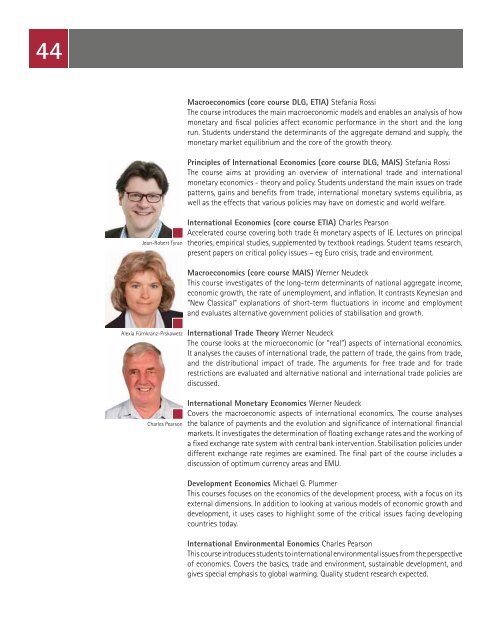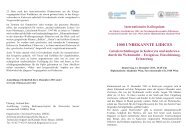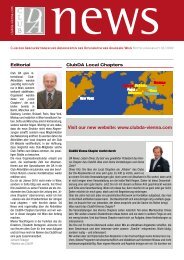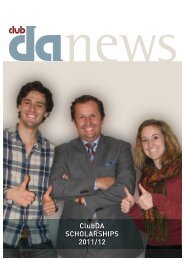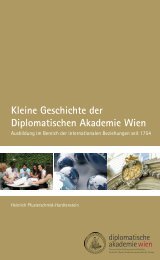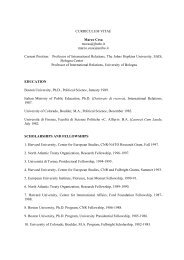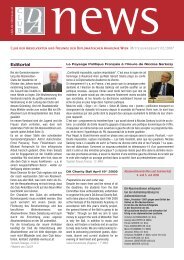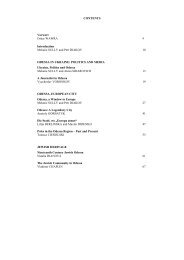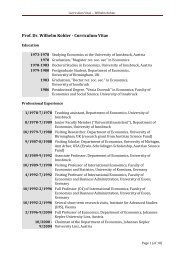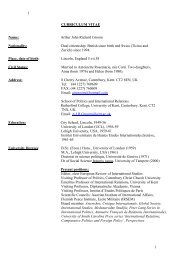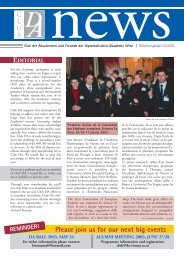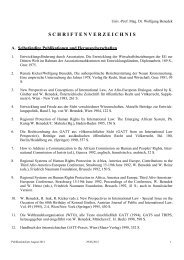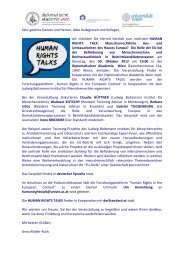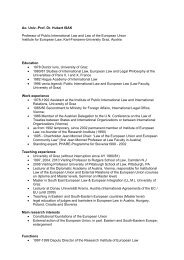Brochure - Diplomatic Academy Vienna
Brochure - Diplomatic Academy Vienna
Brochure - Diplomatic Academy Vienna
You also want an ePaper? Increase the reach of your titles
YUMPU automatically turns print PDFs into web optimized ePapers that Google loves.
44<br />
Jean-Robert Tyran<br />
Alexia Fürnkranz-Prskawetz<br />
Charles Pearson<br />
Macroeconomics (core course DLG, ETIA) Stefania Rossi<br />
The course introduces the main macroeconomic models and enables an analysis of how<br />
monetary and fiscal policies affect economic performance in the short and the long<br />
run. Students understand the determinants of the aggregate demand and supply, the<br />
monetary market equilibrium and the core of the growth theory.<br />
Principles of International Economics (core course DLG, MAIS) Stefania Rossi<br />
The course aims at providing an overview of international trade and international<br />
monetary economics - theory and policy. Students understand the main issues on trade<br />
patterns, gains and benefits from trade, international monetary systems equilibria, as<br />
well as the effects that various policies may have on domestic and world welfare.<br />
International Economics (core course ETIA) Charles Pearson<br />
Accelerated course covering both trade & monetary aspects of IE. Lectures on principal<br />
theories, empirical studies, supplemented by textbook readings. Student teams research,<br />
present papers on critical policy issues – eg Euro crisis, trade and environment.<br />
Macroeconomics (core course MAIS) Werner Neudeck<br />
This course investigates of the long-term determinants of national aggregate income,<br />
economic growth, the rate of unemployment, and inflation. It contrasts Keynesian and<br />
“New Classical” explanations of short-term fluctuations in income and employment<br />
and evaluates alternative government policies of stabilisation and growth.<br />
International Trade Theory Werner Neudeck<br />
The course looks at the microeconomic (or “real”) aspects of international economics.<br />
It analyses the causes of international trade, the pattern of trade, the gains from trade,<br />
and the distributional impact of trade. The arguments for free trade and for trade<br />
restrictions are evaluated and alternative national and international trade policies are<br />
discussed.<br />
International Monetary Economics Werner Neudeck<br />
Covers the macroeconomic aspects of international economics. The course analyses<br />
the balance of payments and the evolution and significance of international financial<br />
markets. It investigates the determination of floating exchange rates and the working of<br />
a fixed exchange rate system with central bank intervention. Stabilisation policies under<br />
different exchange rate regimes are examined. The final part of the course includes a<br />
discussion of optimum currency areas and EMU.<br />
Development Economics Michael G. Plummer<br />
This courses focuses on the economics of the development process, with a focus on its<br />
external dimensions. In addition to looking at various models of economic growth and<br />
development, it uses cases to highlight some of the critical issues facing developing<br />
countries today.<br />
International Environmental Eonomics Charles Pearson<br />
This course introduces students to international environmental issues from the perspective<br />
of economics. Covers the basics, trade and environment, sustainable development, and<br />
gives special emphasis to global warming. Quality student research expected.


